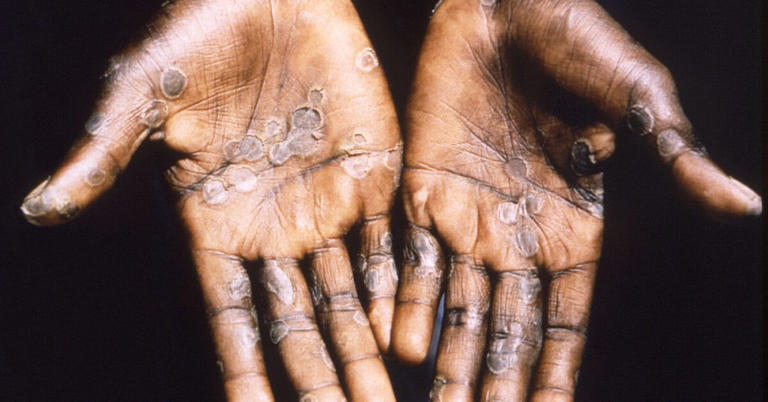New Mpox Strain in Germany: A more infectious variant of the potentially deadly virus has been detected, raising global concerns about its spread. Learn more about its origins, symptoms, and the current outbreak situation.

© Reuters
New Mpox Strain in Germany: What You Need to Know
Germany has reported its first case of a new, more infectious strain of the mpox virus. This discovery is raising concerns about the virus’s spread, especially as it continues to cause significant health challenges in Africa. According to the Robert Koch Institute (RKI), the country’s leading disease control authority, while the risk to the broader population remains low, they are keeping a close watch on the situation and may adjust their guidelines if necessary.
The Spread of the New Mpox Strain
The new mpox strain in Germany, known as clade Ib, was found in an individual who was infected while abroad. Although the RKI did not provide specific details about where this person contracted the virus or where they are currently being treated, the fact that this strain has now reached Germany is noteworthy. This follows recent cases of the same mpox variant being detected in Sweden, Thailand, and India, all in a matter of months.
The spread of mpox outside Africa has been raising alarms worldwide. Earlier this year, the World Health Organization (WHO) declared the growing mpox outbreak a global health emergency for the second time in two years. The situation in Africa is particularly dire, with more than 1,000 deaths reported as of September 2024. The emergence of the new mpox strain in Germany only adds to concerns that the virus may continue to spread internationally.
Mpox in Africa: The Hardest-Hit Region
The Democratic Republic of Congo (DRC) remains the epicenter of the mpox outbreak in 2024. The DRC has reported a staggering 5,399 cases of the virus, along with 25 deaths, as of mid-September. According to the WHO, almost 800 new mpox cases have been confirmed in the DRC in the past four weeks alone. Overall, 18 out of 55 African countries are currently battling mpox outbreaks, and the virus shows no signs of slowing down.
The new mpox strain in Germany is part of a broader trend of the virus spreading beyond Africa, but the continent continues to bear the brunt of the outbreak. In total, the Africa Centres for Disease Control and Prevention reports that there have been 42,438 suspected mpox cases across Africa in 2024. Of these, 8,113 have been confirmed as mpox, and the death toll stands at over 1,000.
What Is Mpox and How Does It Spread?
Mpox is a viral disease that occurs primarily in central and western Africa, though it has now spread to other regions of the world. The virus was first identified in laboratory monkeys, which is how it got its name. Mpox typically spreads through close contact with an infected person, including through skin-to-skin contact or contact with bodily fluids. The virus can also be transmitted through respiratory droplets, although this is less common.
The new mpox strain in Germany, like previous strains, spreads most easily through close physical contact. This has raised concerns about potential outbreaks in communities where people live in close quarters or engage in activities that involve skin-to-skin contact. Mpox can also spread through contact with contaminated objects, such as clothing, bedding, or towels that have been used by an infected person.
Symptoms of Mpox
Mpox symptoms are typically mild but can vary depending on the individual. Common symptoms include:
- Skin rash or pus-filled lesions, which can last for two to four weeks
- Fever
- Headaches
- Muscle aches
- Back pain
- Fatigue
- Swollen lymph nodes
While the new mpox strain in Germany may cause milder symptoms, the virus still poses a significant health risk, especially for those with weakened immune systems. In some cases, mpox can lead to severe complications and even death, particularly if the patient develops secondary infections or the virus affects internal organs.
The Clade Ib Variant: What Makes It Different?
The new mpox strain in Germany, known as clade Ib, was first identified earlier this year in a Congolese mining town. Scientists believe that this variant may cause milder symptoms than earlier forms of the virus. However, what makes the clade Ib variant particularly concerning is its ability to spread more easily through close contact.
This increased transmissibility means that even if the symptoms are less severe, the virus could spread more quickly among populations. As we have seen with the spread of the new mpox strain to countries like Sweden, Thailand, India, and now Germany, the global risk of mpox spreading is still very real.
Treatment and Prevention of Mpox
Currently, there is no specific treatment approved for mpox infections. However, there is a two-dose vaccine available that offers protection against the virus. For most patients with mpox who have healthy immune systems, supportive care and pain management are usually enough to help them recover without the need for more intensive medical treatment.
For the new mpox strain in Germany, the CDC recommends that anyone who has been in contact with an infected person monitor their health closely and seek medical attention if they develop symptoms. Self-isolation is also critical to preventing the spread of the virus.
While there is no cure for mpox, taking steps to reduce the spread of the virus is essential. This includes avoiding close contact with infected individuals, practicing good hygiene, and getting vaccinated if possible.
Global Response to the Mpox Outbreak
The new mpox strain in Germany is just one example of how the virus is spreading beyond its traditional boundaries. Health authorities around the world are working to contain the outbreak and prevent further infections. In Africa, where the virus is most prevalent, the WHO and local health organizations are ramping up efforts to provide vaccines, educate the public, and improve access to healthcare.
In countries like Germany, where the virus is still relatively new, public health officials are taking steps to monitor the situation and adjust their recommendations as necessary. The fact that mpox is spreading to countries outside of Africa highlights the importance of global cooperation in responding to this virus.
Conclusion: Stay Informed and Stay Safe
The detection of the new mpox strain in Germany serves as a reminder that the virus is still a significant global health threat. While the risk to the general population in Germany remains low, it’s essential to stay informed about the situation and take precautions to prevent the virus from spreading further.
As the world continues to battle the ongoing mpox outbreak, paying attention to public health guidance and taking steps to protect yourself and others will be crucial in keeping the virus under control.
Related:
“Lower High Blood Pressure Naturally: 4 Simple Secrets to Success!”



